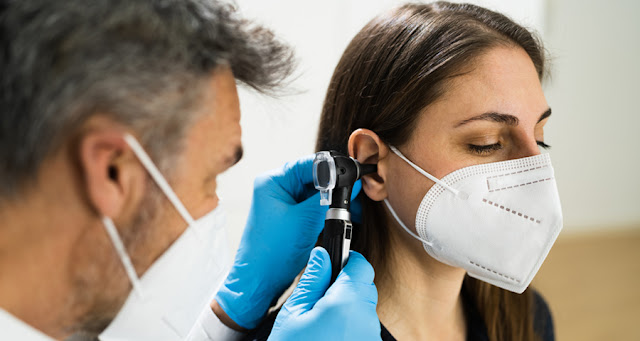The sound of thunder, a blast, or even a cracker can leave a hole in your eardrum. It is called a ruptured or perforated eardrum, and it can happen suddenly.
When it happens, some feel a sharp pain in the ear that eventually goes away, and some may not feel anything.
Usually, ruptured eardrums heal on their own. If it is not, there are medical ways to treat and cure it permanently.
Discomfort in the ear, reduced or hard hearing, air coming freely out of the ear when the nose is blown, overall, an unusual feeling might bring them to the ENT hospital.
Eardrums - Basics First
So, what is an eardrum? Why is it so crucial in hearing? Learn the basics about it so you clearly understand the ruptured eardrum and what to do about it?
The eardrum is a complex thin tissue flap that separates the ear canal from the mid-ear. This tiny flap of skin vibrates when the soundwaves hit it and move the bones connected to the middle ear.
The bone vibrations reach the inner ear and are sent to the brain, where the meaning of sound is interpreted.
Not just the sound duties, but the eardrum protects the middle ear from water, bacteria, and infections.
A Ruptured Eardrum - What Causes It?
Eardrum rupture can occur due to a blast (also known as blast injury), infection in the middle ear, loud sounds (acoustic trauma), and severe head trauma.
Some causes include scuba diving, paragliding, flying, or driving at higher altitudes, sudden change in pressure, and the ear being exposed to continuous shock waves.
The ruptured eardrum heals within a week to two weeks. In some cases, it might lead to infections, need ENT doctor intervention, or even surgery to repair the hole.
Symptoms of Ruptured Eardrum
The symptoms vary from person to person, depending upon the cause of the rupture. Some might feel a sharp pain right after the impact (one of the blast injury symptoms), and some might not experience it.
After the impact, the person might experience a combination of symptoms. Here are the most common symptoms of a ruptured eardrum.
- Episodes of severe headaches that come and go.
- Ear bleeding, pus-filled drainage from the ear, and infections.
- Vertigo (spinning sensation) and tinnitus (ringing sensation).
- Gradual or sudden hearing loss.
- Nausea and vomiting (as a result of vertigo).
When Should One Be Worried?
The symptoms of eardrum rupture are associated with many other ear infections and conditions.
However, if your child is experiencing these symptoms after an exposer to any of the causes of ruptured eardrums mentioned above, book a visit to your nearest ENT hospital.
Diagnosis for Ruptured Eardrum
The ENT specialists conduct the initial diagnosis and explore treatment options for various causes of a ruptured eardrum. This includes acquired hearing loss as a result of a blast injury.
The ENT doctor might use various diagnostic methods to determine the rupture. If it is there, the treatment is focused on healing it by using medications or surgery.
The diagnosis process involves fluid sample testing, otoscope exam (a particular device to check the eardrum), audiology exam, and tympanometry (a special device to check the pressure responsiveness)
Treatment for Ruptured Eardrum
Based on the findings during the diagnosis, the doctor might develop the best possible course of treatment focusing on relieving pain, patch-up the hole, and preventing ear infections.
- Patch-up the Hole - The specialist might use a medicated paper-like patch and places it inside the ear to cover the hole. The paper patch encouraged the eardrum membrane to grow and cover the hole itself.
- Antibiotics - Used in both cases in which an infection causes ruptured eardrum and to prevent infection in cases rupture occurred due to external trauma.
- Surgery - Surgery is employed in rare cases only when the other treatment options fail or are proven ineffective. The procedure is called tympanoplasty. In this procedure, the ENT surgeon takes tissue from other parts of the body and grafts the hole.
If you still have questions about ruptured eardrums, here are a few frequently asked questions on this topic.
What are the home remedies for ruptured eardrums?
If you have been diagnosed with this condition, stop blowing your nose to promote natural healing. Also, place a warm and dry compress on your ear to relieve pain.
How to prevent ruptured eardrums in children below 3?
If your child is experiencing frequent ear infections, consult your family ENT specialist. Check your child’s ear health at regular intervals and prevent them from inserting foreign objects like pencils to avoid damage.
How to take care of your ears and keep your hygiene?
Always dry your ears with a warm towel after a bath, turn the volume down, give your ears the recovery time after a long Zoom meeting or music, force a yawn time-to-time to maintain the pressure. Get regular ear checks; you or your children need them for better ear health.
Vikram ENT Hospital, one of the best ENT hospitals in Coimbatore, provides advanced treatment solutions for ruptured eardrums caused by a blast injury, car accident, or head trauma.
Book an appointment today and follow us for more insightful blogs on ear, nose, and throat health.











